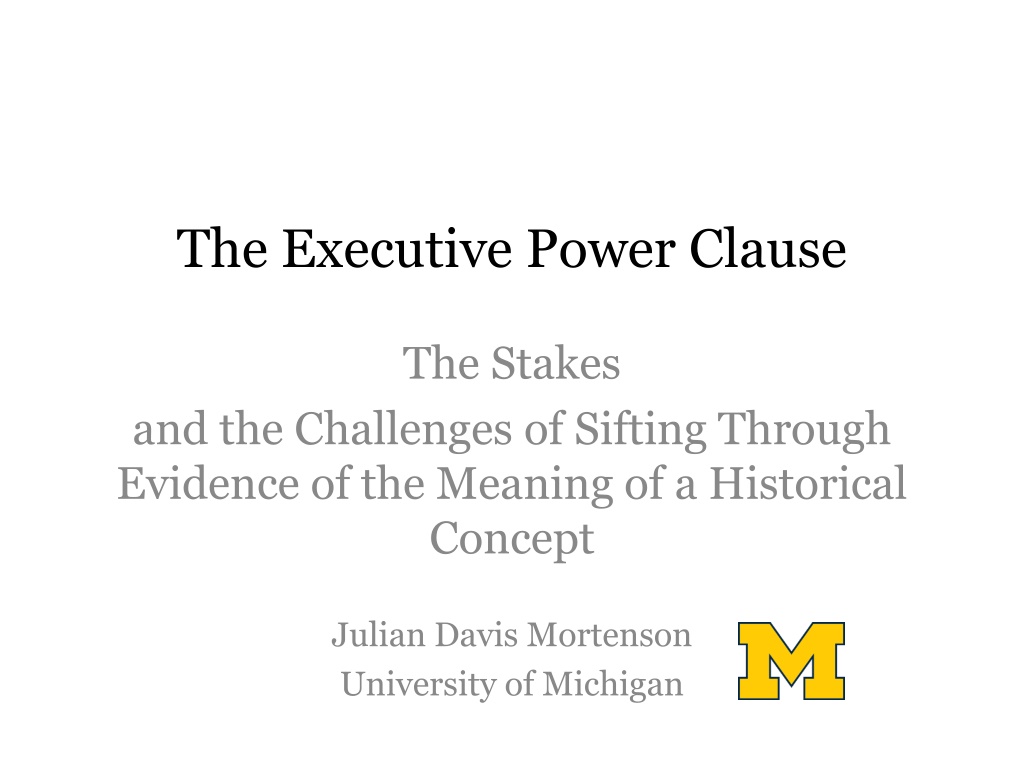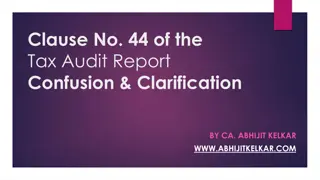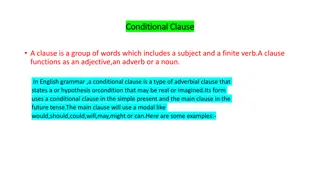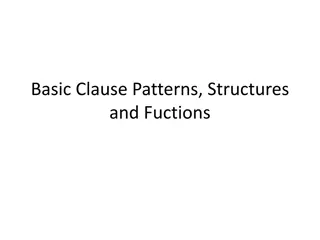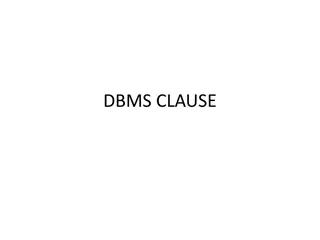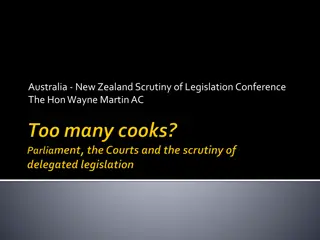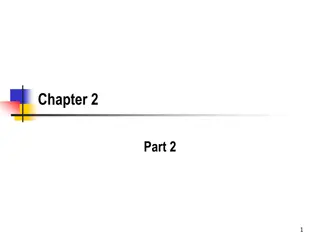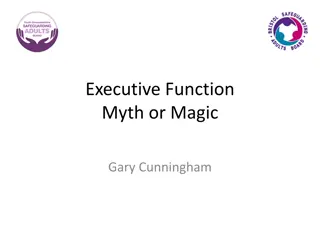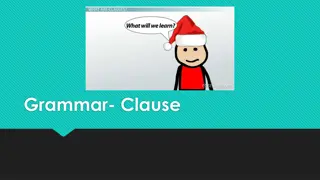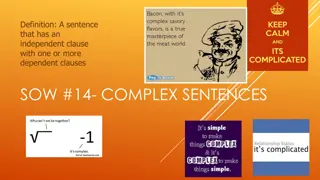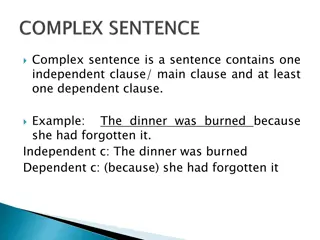The Executive Power Clause: Exploring Historical Concepts and Legal Challenges
Delve into the complexities of interpreting the Executive Power Clause through historical evidence and the implications for presidential actions, including debates on legality in matters like detention and interrogation. Compare with the Legislative Power detailed in Art. I, emphasizing Congress's authority in crucial functions such as taxation, commerce regulation, and national defense.
Download Presentation

Please find below an Image/Link to download the presentation.
The content on the website is provided AS IS for your information and personal use only. It may not be sold, licensed, or shared on other websites without obtaining consent from the author. Download presentation by click this link. If you encounter any issues during the download, it is possible that the publisher has removed the file from their server.
E N D
Presentation Transcript
The Executive Power Clause The Stakes and the Challenges of Sifting Through Evidence of the Meaning of a Historical Concept Julian Davis Mortenson University of Michigan
Can the U.S. President Break the Law? Any effort to apply [federal criminal law] in a manner that interferes with the President s direction of the detention and interrogation of enemy combatants thus would be illegal. U.S. Department of Justice, Internal Memo on Legality of Enhanced Interrogation (2002)
Art. I Legislative Power Congress Shall Have Power To lay and collect Taxes, Duties, Imposts and Excises, to pay the Debts and provide for the common defence and general Welfare of the United States; but all Duties, Imposts and Excises shall be uniform throughout the United States; To borrow Money on the credit of the United States; To regulate Commerce with foreign Nations, and among the several States, and with the Indian Tribes; To establish an uniform Rule of Naturalization, and uniform Laws on the subject of Bankruptcies throughout the [US]; To coin Money, regulate the Value thereof, and of foreign Coin, and fix the Standard of Weights and Measures; To provide for the Punishment of counterfeiting the Securities and current coin of the United States; To establish Post Offices and post Roads; To promote the Progress of Science and useful Arts, by securing for limited Times to Authors and Inventors the exclusive Right to their respective Writings and Discoveries; To constitute Tribunals inferior to the Supreme Court; To define and punish Piracies and Felonies committed on the high Seas, and Offenses against the Law of Nations; To declare War, grant Letters of Marque and Reprisal, and make Rules concerning Captures on Land and Water; To raise and support Armies, but no Appropriation of Money to that Use shall be for a longer Term than two Years; To provide and maintain a Navy; To make Rules for the Government and Regulation of the land and naval Forces; To provide for calling forth the Militia to execute the Laws of the Union, suppress Insurrections and repel Invasions; To provide for organizing, arming, and disciplining, the Militia, and for governing such Part of them as may be employed in the Service of the United States, reserving to the States respectively, the Appointment of the Officers, and the Authority of training the Militia according to the discipline prescribed by Congress; To exercise exclusive Legislation in all Cases whatsoever, over such District (not exceeding ten Miles square) as may, by Cession of particular States, and the Acceptance of Congress, become the Seat of the Government of the United States, and to exercise like Authority over all Places purchased by the Consent of the Legislature of the State in which the Same shall be, for the Erection of Forts, Magazines, Arsenals, dock-Yards, and other needful Buildings; And To make all Laws which shall be necessary and proper for carrying into Execution the foregoing Powers, and all other Powers vested by this Constitution in the Government of the United States, or in any Department or Officer thereof.
Art II Presidential Power The executive power shall be vested in a President of the United States of America The President shall be commander in chief of army & navy He may require the opinion, in writing, of the principal officer in each of the executive departments He shall have power to grant reprieves and pardons He shall have power, by and with the advice and consent of the Senate, to make treaties He shall nominate, and by and with the advice and consent of the Senate, shall appoint ambassadors, . . . judges of the Supreme Court, and all other officers of the United States He may, on extraordinary occasions, convene [or adjourn] both Houses [of Congress] He shall receive ambassadors and other public ministers He shall take care that the laws be faithfully executed
Art II Presidential Power Theexecutive power shall be vested in a President of the United States of America The President shall be commander in chief of army & navy He may require the opinion, in writing, of the principal officer in each of the executive departments He shall have power to grant reprieves and pardons He shall have power, by and with the advice and consent of the Senate, to make treaties He shall nominate, and by and with the advice and consent of the Senate, shall appoint ambassadors, . . . judges of the Supreme Court, and all other officers of the United States He may, on extraordinary occasions, convene [or adjourn] both Houses [of Congress] He shall receive ambassadors and other public ministers He shall take care that the laws be faithfully executed
Art II Presidential Power Theexecutive power shall be vested in a President of the United States of America The President shall be commander in chief of army & navy He may require the opinion, in writing, of the principal officer in each of the executive departments He shall have power to grant reprieves and pardons He shall have power, by and with the advice and consent of the Senate, to make treaties He shall nominate, and by and with the advice and consent of the Senate, shall appoint ambassadors, . . . judges of the Supreme Court, and all other officers of the United States He may, on extraordinary occasions, convene [or adjourn] both Houses [of Congress] He shall receive ambassadors and other public ministers He shall take care that the laws be faithfully executed
Art II Presidential Power Theexecutive power shall be vested in a President of the United States of America The President shall be commander in chief of army & navy He may require the opinion, in writing, of the principal officer in each of the executive departments He shall have power to grant reprieves and pardons He shall have power, by and with the advice and consent of the Senate, to make treaties He shall nominate, and by and with the advice and consent of the Senate, shall appoint ambassadors, . . . judges of the Supreme Court, and all other officers of the United States He may, on extraordinary occasions, convene [or adjourn] both Houses [of Congress] He shall receive ambassadors and other public ministers He shall take care that the laws be faithfully executed
Art II Presidential Power Theexecutive power shall be vested in a President of the United States of America The President shall be commander in chief of army & navy He may require the opinion, in writing, of the principal officer in each of the executive departments He shall have power to grant reprieves and pardons He shall have power, by and with the advice and consent of the Senate, to make treaties He shall nominate, and by and with the advice and consent of the Senate, shall appoint ambassadors, . . . judges of the Supreme Court, and all other officers of the United States He may, on extraordinary occasions, convene [or adjourn] both Houses [of Congress] He shall receive ambassadors and other public ministers He shall take care that the laws be faithfully executed
What Does the Vesting Clause Do? 1. Cross-Reference Theory specifies that onlythe President can exercise the specific powers listed in Article II 2. Law Execution Theory grants an additional power to the President: the power to execute the laws 3. Royal ResiduumTheory grants an additional power to the President: all otherwise-unallocated royal authority
Two Vesting Clauses U.S. Const. Article II 1st sentence The executive power shall be vested in a President of the United States of America. Blackstone Vol 1, Ch. 3 1st sentence The supreme executive power of these kingdoms is vested by our laws in a single person, the king or queen.
Constitutional Authorities of 18th Century British Crown* possesses possesses partakes in The Executive Power The Royal Prerogative The Legislative Power Carry into execution the laws, both common and statutory Make treaties Act as generalissimo Send and receive ambassadors Make war and peace Act as constituent part of legislative power Establish courts of justice Seize all whale and sturgeon caught on coast . . . Absolute veto on Acts of Parliament, in the King s role as a constituent element of the King- in-Parliament *according to Blackstone!
Constitutional Authorities of 18th Century British Crown* possesses possesses partakes in The Executive Power The Royal Prerogative The Legislative Power Carry into execution the laws, both common and statutory Make treaties Act as generalissimo Send and receive ambassadors Make war and peace Act as constituent part of legislative power Establish courts of justice Seize all whale and sturgeon caught on coast . . . Absolute veto on Acts of Parliament, in the King s role as a constituent element of the King- in-Parliament *according to Blackstone!
